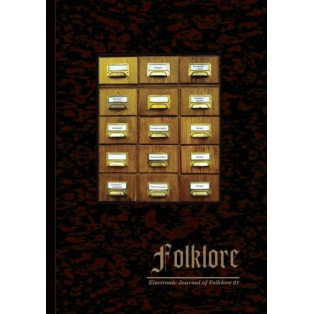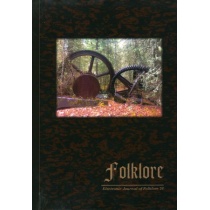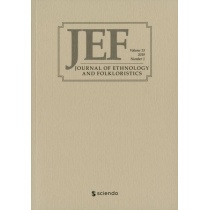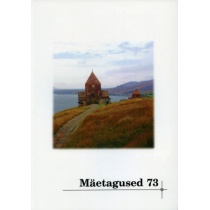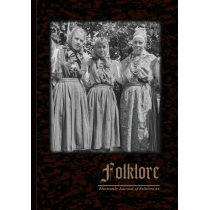Folklore 91
The 91st volume of Folklore: Electronic Journal of Folklore, compiled by guest editors Mari Sarv, Ave Goršič and Risto Järv, is dedicated to archives as knowledge hubs.
The articles in this volume can be divided into three groups: (1) the ones dealing with the flow of materials into archives; (2) the articles that focus on the actions and activities within the archives that by and large remain invisible on the outside; and (3) the articles inquiring about the new life and uses of archival materials that through different channels and dissemination have flown out of the archives.
In his article on ethnographic fieldwork, Indrek Jääts details the five expeditions made by Aleksei Peterson, director of the Estonian Ethnography Museum, and his colleagues to the Southern Veps’ villages in the late 1960s. The article sheds light on the personality of the researcher, the sociocultural situation, ideological background, institutional framework, recording technologies, as well as research paradigms directing the fieldwork.
Jacek Jackowski explores the value of different types of sources of traditional music in the context of contemporary Polish folk music research and practices, contemplating the real quality and historical truth of the contemporary revival or reconstruction of music, also focusing on the work of folklore collector Oskar Kolberg.
Yanina Hrynevich examines the formation circumstances and development of folklore collections in Belarus, concentrating on the main ideas and the most influential collectors and groups of collectors and the ebbs and tides of the political eras that have influenced this process.
The articles and discussions concentrating on the internal, hidden work of the archives constitute the bulk of this volume. Rūta Žarskienė analyses the activities of the Lithuanian Science Society and the history of its folklore collecting, also illustrating the laborious work of compiling collections and modern digital databases.
Liina Saarlo describes in her article the chess game between the politics, ideologies, folklorists and archives on the example of the Estonian Folklore Archives, exploring the Soviet modernist worldview expressed in research policy, including folkloristics, and its acceptance among Estonian folklorists, and analysing the balancing act of authenticity in folklore research.
Päivi Mehtonen & Tarja Soiniola describe an interdisciplinary project set up for the collection of manuscripts produced during the period of ca. 1780–1830 by craftsmen and peasants along the coast of the Gulf of Bothnia in Finland, the preservation process of the collection, but also the background of the not necessarily positive backdrop of forming such a historic collection.
Viktor Denisov lists the important work of Udmurt and Estonian researchers in collecting and preserving Udmurt folklore; Katalin Lázár describes the labour and pains of compiling an elaborate database on Hungarian traditional games; and Mall Hiiemäe discusses the historical process of collecting folklore in Estonia and how the Estonian Folklore Archives has built itself up as a knowledge hub, and the responsibility it bears to its informants.
In the out-flow frame, Helen Kõmmus studies, compares and analyses participatory music-making at Estonian and Finnish folk music festivals, arguing that although the social dynamics of Finnish and Estonian festival participants may vary, the ultimate goal is still to form a united community, (re)presenting the old for the future of the new.
Sille Kapper-Tiisler analyses a part of dance folklore that is not so easily archived, described or reproduced – the bodily dimension of dance movements. She points out that as well as archives, human bodies are also knowledge hubs, which collect, preserve, develop and pass on the knowledge, and in order to understand the dance manuscripts in their depth, the dance descriptions need to be re-bodied to understand their true nature.
Carme Oriol and Emili Samper illustrate the experience of opening a folklore archive structured under a university to society and the social impact an archive could possibly have on society with its activities and open-access databases.
The issue also offers an overview of a conference focusing on the study of modern traditions, and of an Estonian-Udmurt webinar about visual recording, as well as a book review.
Folklore: EJF is a peer-reviewed open-access academic journal published since 1996, and the current issue is available online at https://www.folklore.ee/folklore/vol91/.
Tiina Mällo
The articles in this volume can be divided into three groups: (1) the ones dealing with the flow of materials into archives; (2) the articles that focus on the actions and activities within the archives that by and large remain invisible on the outside; and (3) the articles inquiring about the new life and uses of archival materials that through different channels and dissemination have flown out of the archives.
In his article on ethnographic fieldwork, Indrek Jääts details the five expeditions made by Aleksei Peterson, director of the Estonian Ethnography Museum, and his colleagues to the Southern Veps’ villages in the late 1960s. The article sheds light on the personality of the researcher, the sociocultural situation, ideological background, institutional framework, recording technologies, as well as research paradigms directing the fieldwork.
Jacek Jackowski explores the value of different types of sources of traditional music in the context of contemporary Polish folk music research and practices, contemplating the real quality and historical truth of the contemporary revival or reconstruction of music, also focusing on the work of folklore collector Oskar Kolberg.
Yanina Hrynevich examines the formation circumstances and development of folklore collections in Belarus, concentrating on the main ideas and the most influential collectors and groups of collectors and the ebbs and tides of the political eras that have influenced this process.
The articles and discussions concentrating on the internal, hidden work of the archives constitute the bulk of this volume. Rūta Žarskienė analyses the activities of the Lithuanian Science Society and the history of its folklore collecting, also illustrating the laborious work of compiling collections and modern digital databases.
Liina Saarlo describes in her article the chess game between the politics, ideologies, folklorists and archives on the example of the Estonian Folklore Archives, exploring the Soviet modernist worldview expressed in research policy, including folkloristics, and its acceptance among Estonian folklorists, and analysing the balancing act of authenticity in folklore research.
Päivi Mehtonen & Tarja Soiniola describe an interdisciplinary project set up for the collection of manuscripts produced during the period of ca. 1780–1830 by craftsmen and peasants along the coast of the Gulf of Bothnia in Finland, the preservation process of the collection, but also the background of the not necessarily positive backdrop of forming such a historic collection.
Viktor Denisov lists the important work of Udmurt and Estonian researchers in collecting and preserving Udmurt folklore; Katalin Lázár describes the labour and pains of compiling an elaborate database on Hungarian traditional games; and Mall Hiiemäe discusses the historical process of collecting folklore in Estonia and how the Estonian Folklore Archives has built itself up as a knowledge hub, and the responsibility it bears to its informants.
In the out-flow frame, Helen Kõmmus studies, compares and analyses participatory music-making at Estonian and Finnish folk music festivals, arguing that although the social dynamics of Finnish and Estonian festival participants may vary, the ultimate goal is still to form a united community, (re)presenting the old for the future of the new.
Sille Kapper-Tiisler analyses a part of dance folklore that is not so easily archived, described or reproduced – the bodily dimension of dance movements. She points out that as well as archives, human bodies are also knowledge hubs, which collect, preserve, develop and pass on the knowledge, and in order to understand the dance manuscripts in their depth, the dance descriptions need to be re-bodied to understand their true nature.
Carme Oriol and Emili Samper illustrate the experience of opening a folklore archive structured under a university to society and the social impact an archive could possibly have on society with its activities and open-access databases.
The issue also offers an overview of a conference focusing on the study of modern traditions, and of an Estonian-Udmurt webinar about visual recording, as well as a book review.
Folklore: EJF is a peer-reviewed open-access academic journal published since 1996, and the current issue is available online at https://www.folklore.ee/folklore/vol91/.
Tiina Mällo
Tootekood: 100752
Ühik: eks
5,00 €

